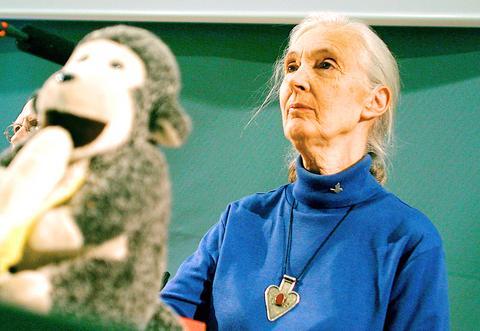You partied on it all summer long, now it's time go clean up the beach. Dr Jane Goodall will be in town tomorrow to help Taiwan clean up the shoreline at Liukuai north of Danshui as part of her Roots and Shoots network of community volunteers.
The Roots and Shoots program began when 16 students gathered with Dr Goodall on her front porch in Tanzania in 1991. The students were fascinated by animal behavior and concerned about the state of the environment. But their schools didn't cover these topics. The students wondered if they could further these interests through out-of-school activities.

PHOTO: AP
Their conversation ranged from how to help chimpanzees to how their actions might affect their communities. The 16 returned to their schools with a task: Find other interested young people and take action. And so the Roots and Shoots program was born.
Roots and Shoots groups undertake "service-learning" projects that promote care and concern for animals, the environment or the community. There are more than 6,000 groups ranging in size from two to 2,000 members registered in more than 87 countries.
Their mission is to foster respect and compassion for all living things, to promote understanding of all cultures and beliefs, and to inspire each individual to take action to make the world a better place for people, animals, and the environment.
And sometimes to clean up a beach. The local chapter of the International Jane Goodall Association will be picking up volunteers at the Hongshulin MRT station bright and early at 8:30am. Organizer Zhu Pei-wen (朱珮文) asked that no one be late, but said the bus may be making a second or third trip, depending on the number of volunteers. She also warned that the coastal winds at Danshui can be fierce and chilly and advised that everyone dress accordingly.
Following the clean-up, Dr. Goodall will give a talk on volunteering for the community at the lecture hall of Zhen Li University (真理大學活動中心演講廳). Box lunches will be made available.
Teachers, if you're interested in incorporating Roots and Shoots community-awareness programs into your class curriculum, there is information available on the Web, including lesson plans for all ages. Check out http://www.rootsandshoots.org/in-schools/default.asp for more information.
Performance notes:
WHAT: Beach Clean-up
WHERE: LiuKuai Beach. Meet for bus pick up at Honshulin MRT Station
WHEN: Tomorrow, Saturday, Dec. 4, at 8:30am. Clean-up will go until 4pm.

This is the year that the demographic crisis will begin to impact people’s lives. This will create pressures on treatment and hiring of foreigners. Regardless of whatever technological breakthroughs happen, the real value will come from digesting and productively applying existing technologies in new and creative ways. INTRODUCING BASIC SERVICES BREAKDOWNS At some point soon, we will begin to witness a breakdown in basic services. Initially, it will be limited and sporadic, but the frequency and newsworthiness of the incidents will only continue to accelerate dramatically in the coming years. Here in central Taiwan, many basic services are severely understaffed, and

Jan. 5 to Jan. 11 Of the more than 3,000km of sugar railway that once criss-crossed central and southern Taiwan, just 16.1km remain in operation today. By the time Dafydd Fell began photographing the network in earnest in 1994, it was already well past its heyday. The system had been significantly cut back, leaving behind abandoned stations, rusting rolling stock and crumbling facilities. This reduction continued during the five years of his documentation, adding urgency to his task. As passenger services had already ceased by then, Fell had to wait for the sugarcane harvest season each year, which typically ran from

It is a soulful folk song, filled with feeling and history: A love-stricken young man tells God about his hopes and dreams of happiness. Generations of Uighurs, the Turkic ethnic minority in China’s Xinjiang region, have played it at parties and weddings. But today, if they download it, play it or share it online, they risk ending up in prison. Besh pede, a popular Uighur folk ballad, is among dozens of Uighur-language songs that have been deemed “problematic” by Xinjiang authorities, according to a recording of a meeting held by police and other local officials in the historic city of Kashgar in

It’s a good thing that 2025 is over. Yes, I fully expect we will look back on the year with nostalgia, once we have experienced this year and 2027. Traditionally at New Years much discourse is devoted to discussing what happened the previous year. Let’s have a look at what didn’t happen. Many bad things did not happen. The People’s Republic of China (PRC) did not attack Taiwan. We didn’t have a massive, destructive earthquake or drought. We didn’t have a major human pandemic. No widespread unemployment or other destructive social events. Nothing serious was done about Taiwan’s swelling birth rate catastrophe.